COP28 came to a close last week, with the sustainable food systems topic receiving ample discussion.
The meeting was the stage for progress on certain areas (the first formal agreement to move away from fossil fuels) and stalls on others (no language calling for “phase out” of fossil fuels along with numerous loopholes).
And despite a series of groundbreaking agreements, initiatives, and pledges regarding sustainable food systems, many were left frustrated and unsatisfied with the results of this year’s meeting.
Following our previous report, here we provide a snapshot of the remaining food system highlights of COP28.
(Read our coverage of the first half of COP28 here.)
FAO publishes agrifood roadmap
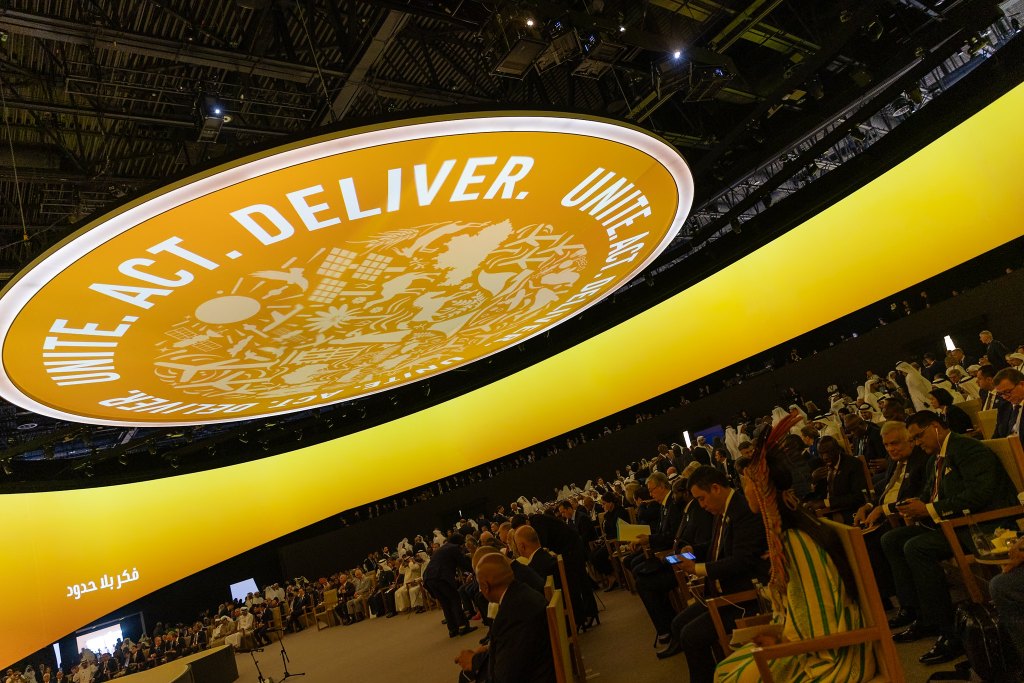
On 10 Dec, the Food and Agriculture Association of the United Nations (FAO) released its roadmap for agrifood to aid in limiting global warming to 1.5°C. Among the 120 recommended initiatives listed in the plan are halving food waste by 2030 and slashing livestock emissions by 25% by 2030.
The roadmap acknowledges the need to reduce meat and dairy emissions but says plant-based foods cannot provide a sufficient amount of certain nutrients, even stating that meat production should be increased to address health challenges in certain nations.
A group of organisations called out gaps in the roadmap in a joint letter, participants including ProVeg International, Friends of the Earth, and Green Queen, among others.
160 nations / territories sign declaration on agriculture, food systems, and climate
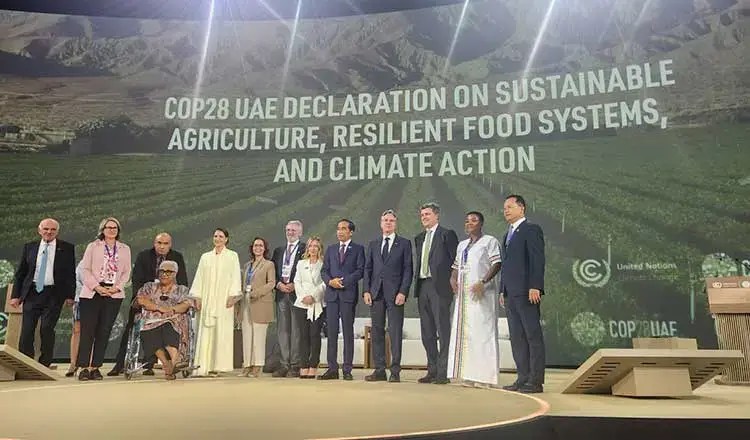
160 countries and territories signed the Emirates Declaration on Sustainable Agriculture, Resilient Food Systems, and Climate Action. Among the actions the declaration calls for are to accelerate and scale science and evidence-based innovations – however, the statement makes no reference to reducing meat or dairy production nor to alternative proteins as a means to supplement such a reduction.
WEF launches First Movers Coalition for Food
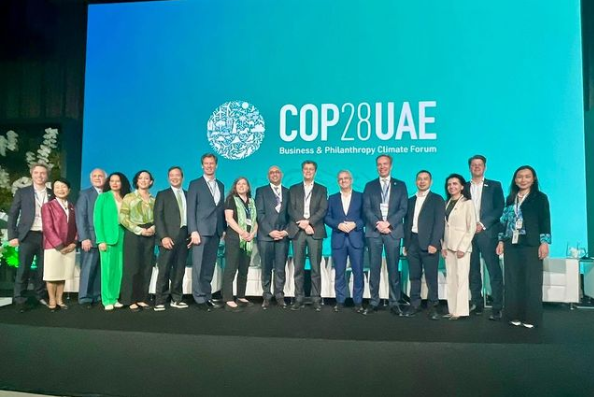
The World Economic Forum (WEF) launched the First Movers Coalition for Food with the goal of creating aggregated market demand for sustainably produced and low-emission agricultural commodities. With members including companies like Bayer, Cargill, Tyson, Danone, Nestlé and PepsiCo, the coalition aims to create a combined procurement commitment of $10 to $20 billion by 2030.
Like other initiatives announced during COP28, the coalition calls for more sustainable food production processes without addressing a scale down in meat or dairy production.
IFAD launches new financing mechanism for food producers in East Africa
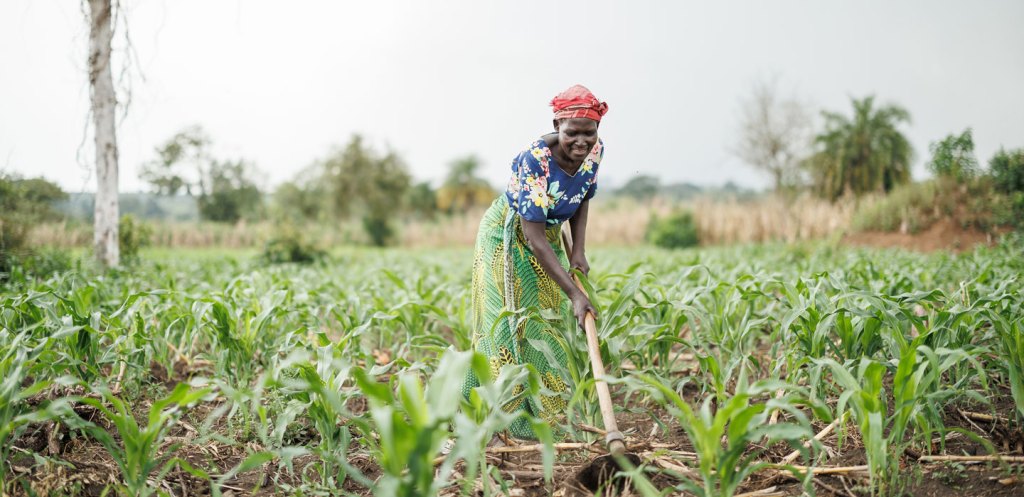
Following the recent release of data confirming a sharp global decline in climate finance dedicated to adaptation efforts, the UN’s International Fund for Agricultural Development (IFAD) and partners launched a new $200M financing mechanism to boost support to small-scale food producers in Kenya, Rwanda, Tanzania, and Uganda.
In an op-ed for The Conversation, food systems expert Florian Kroll lays out why he thinks the COP28 commitments to Africa’s food systems are grossly inadequate.
New food systems transformation alliance launched
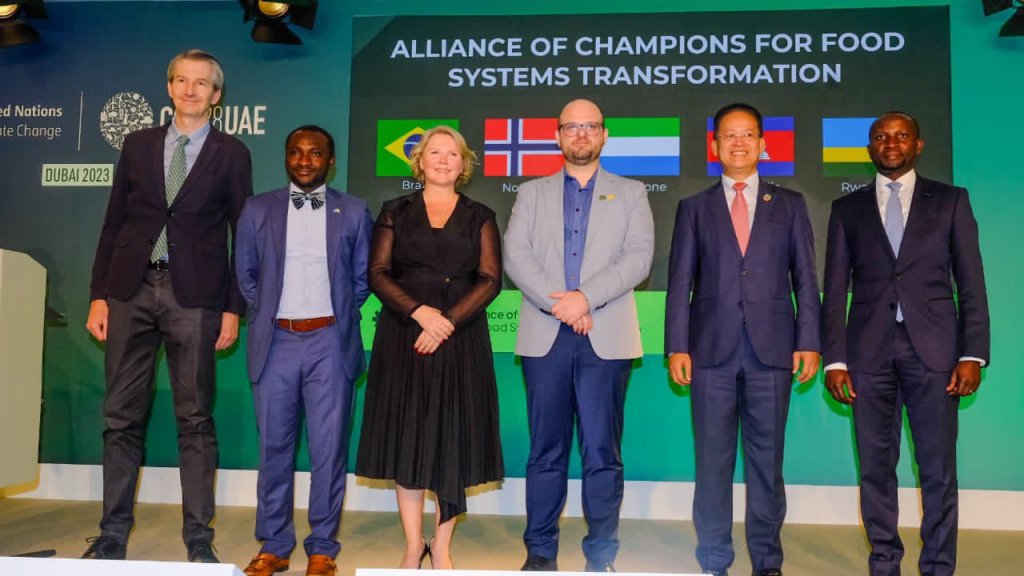
Five countries founded the new Alliance of Champions for Food Systems Transformation (ACF) with the goal of providing universal access to affordable, nutritious and sustainable diets. Made up of Brazil, Norway, Sierra Leone, Cambodia, and Rwanda, the alliance says it will work to reorient policies, practices, and investment priorities to deliver better food systems outcomes.
Gates & Bezos pledge to invest in food security

The Bill & Melinda Gates Foundation, in partnership with the UAE, pledged to invest $200M in innovation for smallholder farmers in sub-Saharan Africa and South Asia. Gates also called on global leaders attending COP28 to increase climate finance initiatives for agriculture and to support the global agriculture research network, CGIAR.
Meanwhile, The Bezos Earth Fund announced $57M food-related grants as part of a $1B commitment to addressing the impact of food systems on climate, with the rest of the funds to be distributed by 2030.
Recap of updates from our previous article:
- A group of major food companies formed an alliance to combat methane from the dairy industry.
- The Plant-Based Treaty released a detailed report on vegan doughnut economics.
- The WTO and FAO signed an MoU on trade, food, and climate change.
- The UAE launched a Food Innovation Hub to strengthen food systems.
- The Global Cellular Agriculture Alliance co-hosted the event’s Food System Pavilion, with speakers including Change Foods.
To stay up-to-date on the latest industry headlines, sign up to Future Alternative’s enewsletter.


